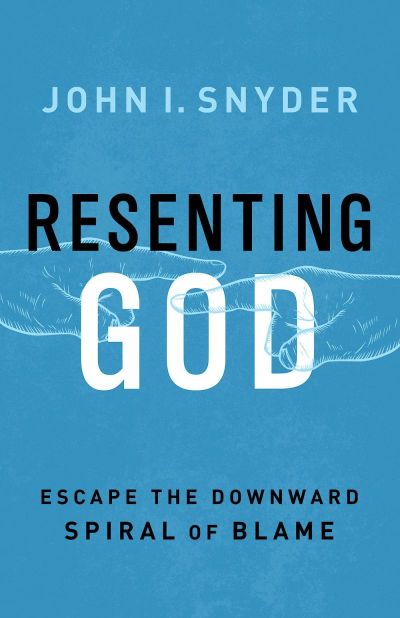'Resenting God': When Christians Feel Anger, Where Churches Fail, and Why the Bible Is Vital

Resentment of God is something that affects both Christians and atheists, yet few are able to admit it, and churches struggle to help, an author, pastor and church planter says.
John I. Snyder, an ordained pastor of the Presbyterian Church (U.S.A.), who has served in missions around the world and speaks at conferences across the U.S. and Europe, argues in Resenting God: Escape the Downward Spiral of Blame that resentment and anger are on the rise in today's social climate.
As people deal with ever-growing confusion, injustice, and depression, many are blaming God for their pain, which is leading some to become disillusioned with Christianity, or walk away from faith altogether, he warns.
Resenting God tackles the many different reasons people become resentful toward God, from seemingly unanswered prayers to loss and suffering, and how that takes a grip on one's life, with the negative effects spreading out toward the rest of society as well.
The author, who has taught New Testament studies at New College, Berkeley, California, shares of his own grief, frustration, and confusion when he underwent significant hardship and lost most of his eyesight for several years.
Greatly challenging was that his Christian friends and pastor deemed his "raw response" to be unacceptable for a believer, an attitude that Snyder warns continues to manifest in many churches, isolating Christians who are struggling.
The book, which was published on October 16, argues that much of these attitudes stem from an inaccurate view of God that misunderstands the role of suffering in faith, and advocates for the importance of good biblical teaching.
"We've all been there or are there. It can strike any person, anytime, anywhere. If we let down our guard and begin to give in to it, we'll be pulled into a powerful downward spiral that we can't escape by our own strength," he writes about resentment.
"We find ourselves asking: 'How can I forgive when the pain is so great? Does forgiving mean I have to forget the past? What if I choose not to forgive?'"
The book delves into the lives and various experiences of Christians around the world, including those under severe, daily persecution in North Korea, and how their view on suffering differs from many in the West.
Still, Resenting God offers hope and inspiration for those who feel their church doesn't understand them and feel like they are being punished by God, affirming that God knows what people are going through, and will not walk away from them.
Below is a Q&A The Christian Post conducted with Snyder about Resenting God, which also touches upon some of the most difficult questions believers have, such as why does God allow suffering.
The email interview, conducted on Thursday, has been edited for clarity.
CP: You mention that resentment against God isn't often preached at church. Do you feel that many pastors/church-leaders are ill-equipped to address the topic? Or are there not many good ways to address it at church at all?

Snyder: I think most pastors and church leaders are very capable of addressing this topic, but I have found many pastors feel uncomfortable with discussing it because resenting God is considered something Christians should never do, almost blasphemous — we shouldn't complain about God or feel any resentment or bitterness toward him. I don't know if anyone has ever said that to you, but it's a lie.
Telling us not to resent or complain about God overlooks the fact that disillusionment with God and resentment toward him is a common and longstanding experience of God's people, going far back into the Old Testament. Moses (Numbers 11:10-15), Jonah (Jonah 3–4), Elijah (1 Kings 19:1-5), and Jeremiah (Jeremiah 20:7) went through it, as well as many believers in church history up to the present day.
So there are sufficient precedents for teaching and preaching on the problem. However, there's a general understanding that believers need to promote Christian life as "every day with Jesus is sweeter than the day before." Anything else just doesn't advertise well.
CP: In the book you point out the many reasons, including mistaken ideas of God, for why people come to resent God. What would you say are the root causes that lead people to gain mistaken perceptions of God?

Snyder: I'd summarize it as a lack of correct biblical teaching which leads inevitably to a misunderstanding of the character, ways, and purposes of God. This is made worse by a tendency to nurture our resentments along with others who feel the same way we do, opening ourselves up to the kind of relativism that leads us to believe whatever it is that we feel.
When we neglect Bible reading, we ignore the daily flow of biblical ideas and instead tend to adopt the ideas around us, or allow our own imaginations to fill in the theological blanks — typically with the most common illusions and myths.
These factors lead to a growing resentment against God. We end up tending to avoid contact and honest conversations with other believers who could help us understand what we are going through. When wounded, we can't rely on our own perceptions of things to get us through.
We need the body of Christ to log in on the struggles and doubts we may be experiencing. Some Christians won't understand, but many have been where we are now, including pastors who have passed through this spiritual desert and emerged successfully.
CP: You talk about the persecution of Christians in North Korea, and how that compares to people in Western countries who call themselves Christians but do not really act like Jesus.
Is there an argument to be made that those who suffer more are closer to Christ? When Christians in comparatively affluent nations pray for peace and prosperity in their own lives, and to some extent receive those things, are they perhaps limiting how the Christian faith is to be experienced?
Snyder: We all want peace and prosperity (and lots of it), but historically that's not how God usually grows us up. No old saint ever got that way by a hammock in the shade. Like it or not, suffering always has been high on the list of spiritual growth experiences, and whereas we may avoid it like the plague, nevertheless, it tends to come our way — regardless of whether we are living in affluence or poverty. God is sovereign over everything, and there is no way we can limit the heights or depths of growth in our faith he calls us to experience.
The New Testament often speaks of the power of suffering, when blessed of God, to form within us the kind of maturity he seeks (Romans 5:3-4; 1 Peter 1:6-7; James 1:2-4).
Regarding those who call themselves Christians, but don't really act like Jesus — well, we aren't called (or qualified) to judge their salvation, but we do have a right to question and evaluate their behavior based on their outward actions. Disciples of Jesus are known by their fruit.
CP: You note that atheists often times also have resentment toward God, even if they don't directly admit it. What is it about resentment that makes people, Christians included, so reluctant to admit that they hold it?
Snyder: For some atheists (not all), resentment lies at the root of their denial of God's existence. Often, the pattern is: they prayed fervently, God didn't deliver; he very easily could have if he existed, so, therefore, there isn't a God. It's something like a temper tantrum. Also, if you deny God, you don't have to accept the truth of God's sovereignty, or of being accountable to a higher power. I think this is the core issue.
For Christians, I think there is often a sense of "spiritual shaming" in feeling resentment toward God; being resentful or bitter towards God earns you your degree in spiritual inferiority or failure. We have an image to maintain, particularly when among other church people who appear to have it all together. Those who doubt and those who resent aren't usually among the most admired or respected. They might even be shunned in some communities.
CP: The question of why God allows evil and suffering seems to be in the heart of so many debates about religion. Often times, Christians do not have a great answer to that question. How do you approach it?
Snyder: Why did God permit it? This is probably the number one question raised against God and the Bible. If there is a loving God, why would He allow this or that? Our first response should be complete honesty: we aren't given a neat and tidy answer. Only God knows why. But we can say some things that allow us to maintain an intelligent confidence in a loving God.
God is always sovereign, and nothing happens in His universe that surprises Him or causes Him to wring His hands in despair or consternation. What the believer needs to keep in mind is that there never has been, or will be, a square yard on the planet where God has been absent or uninvolved. The final act of the play, and the resolution to the mystery, is always in His hands.
There are some theological answers to the question of evil and suffering, but when the pain of loss is still great, the person isn't quite ready for them. Comfort is the first order of the day. Not in counseling, but in a debate setting, some points could be brought out:
First, if God simply stopped all evil in the world, every society would come to a grinding halt within minutes. Anything against His will would not be allowed to happen.
Second, we know from many passages in Scripture and the annals of church history that whereas God allows evil a relatively free reign, it's still on a leash. The "Restrainer" (2 Thessalonians 2:6) has always kept the world from becoming as bad as it could be, or wanted to be. Without God's involvement, the world would be utterly uninhabitable.
Third, rather than obliterate all evil right now, God has chosen rather to use and exploit it for His own purposes (Genesis 50:20; Romans 8:28). What evil people and powers want to do are often permitted to fulfill their purposes, but in doing so are also fulfilling God's higher plan, much like what happens in a sports contest, a military strategy, or even a chess game. My favorite illustration of this pattern is the Joseph story in Genesis, the plan of action God has followed up to the present day.
CP: The Bible has several figures and passages that express sadness, lamentation, and in some ways resentment toward God. Does that show that resentment has been a part of the human condition since the beginning?
Snyder: I think that it has; I see it as part of the Fall. Cain resented Abel to the extent that it flowered into a bitter hatred. In Genesis we read, "Cain was very angry, and his face was downcast." A classic facial expression of resentment! This resentment led to the first murder recorded in the Bible.
Human beings carry within the seeds of the Fall. The only way out of this is a complete and honest evaluation of self, with God's help turning away from all our bitterness, hatred, and resentments, and bringing them to Jesus Christ, the only person who is able to deliver us.
CP: To ask a difficult question about your personal experience of initially losing your eyesight, and then regaining it — do you feel that you would have struggled with resentment and faith more if you had never regained your vision?
Snyder: That is an excellent question. Actually, after my long journey of resentment and disillusionment, I had come to a point of acceptance — God is God, he is sovereign, and if he had chosen to take away the use of my eyes, then I had to trust that this was his best for me.
It was only following this that my eyesight was restored to the point where now I can do much of what I had lost. And with that exodus, he supplied me with more compassion and grace for others going through their valley experiences.
CP: What advice or message do you have to give to people who have resentment toward God, but at the moment do not see much hope in their lives?
Snyder: We must keep in mind that the story is not over. Don't give up. There is absolutely no situation that you're in where God cannot enter. One of my favorite things about God is that he loves to create ex nihilo — out of nothing. God creates for us an exodus — a way out and a way in. With God factored in your situation, there is never a case where there is no solution.
Just quickly, I remember when my family and I were vacationing in Europe, we had booked a hotel, with little knowledge of the surrounding area. On our way back from dinner, later than expected, I looked back and noticed that we were being followed. When I looked ahead, I became aware of a man in front of us hastening his steps toward us. A quick glance at our surroundings confirmed there was no one else around and we'd soon be approaching a huge bush (a very dark area) on the side of the walkway.
I calculated that we'd be at the bush when both men and we would meet. If you're with your beautiful wife and two beautiful daughters, you start to worry and pray fervently. As we approached the bush and both men were within striking range, suddenly, from the midst of the bush emerged a third man with a huge dog. I remember thinking, "Why does this man have a bear with him?" No sooner had the thought occurred, when both men suddenly fled together to the other side of the road and disappeared into the darkness. The man with the dog walked steps behind us to our hotel and was gone. In an instant, God created ex nihilo a way out that didn't exist before. Suddenly, unexpectedly, He entered into our dangerous situation and brought us safely home. Who could have predicted this?
My general advice to people in their resentment is never bail out, or walk out of the play in the middle of Act III. Stay around to see what kind of deliverance God is going to bring your way. In his time, He will. Allow Him to turn your bad experience into a story you can tell your grandchildren about.




























